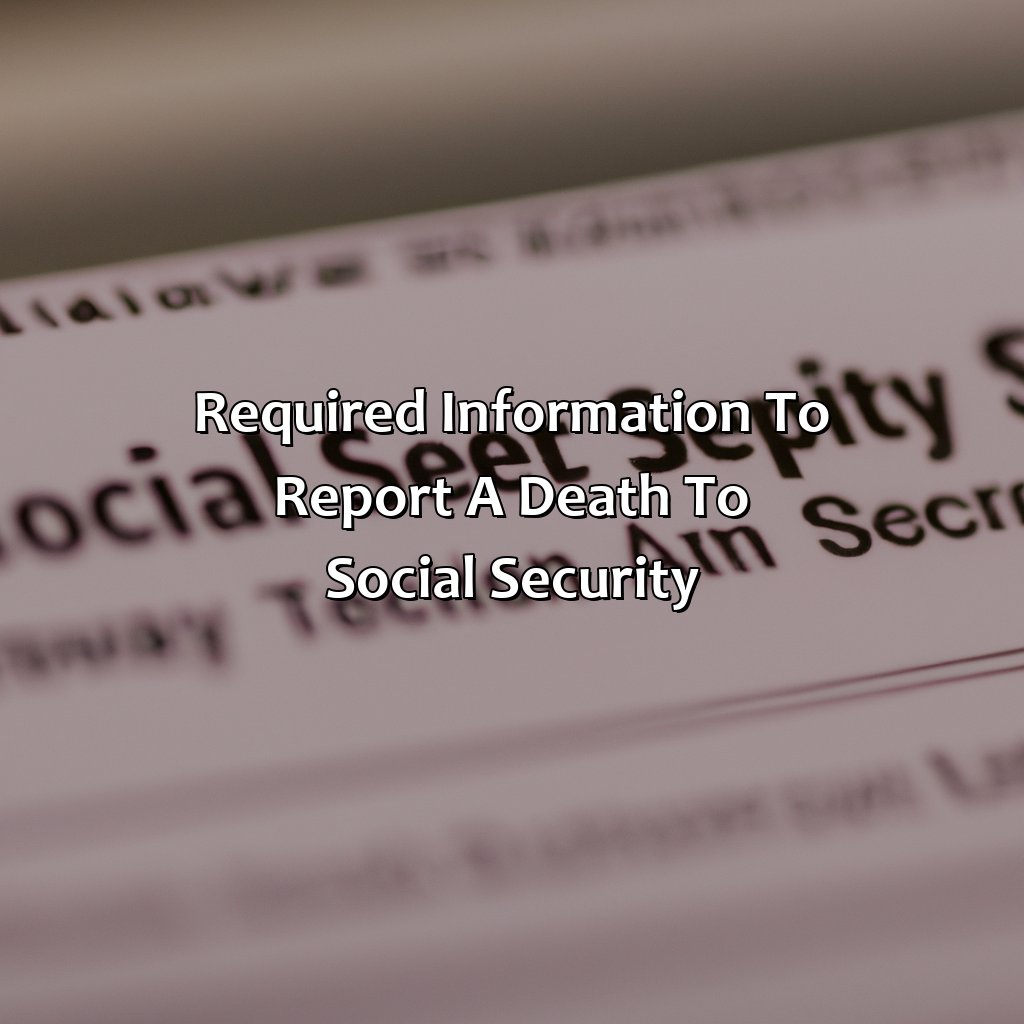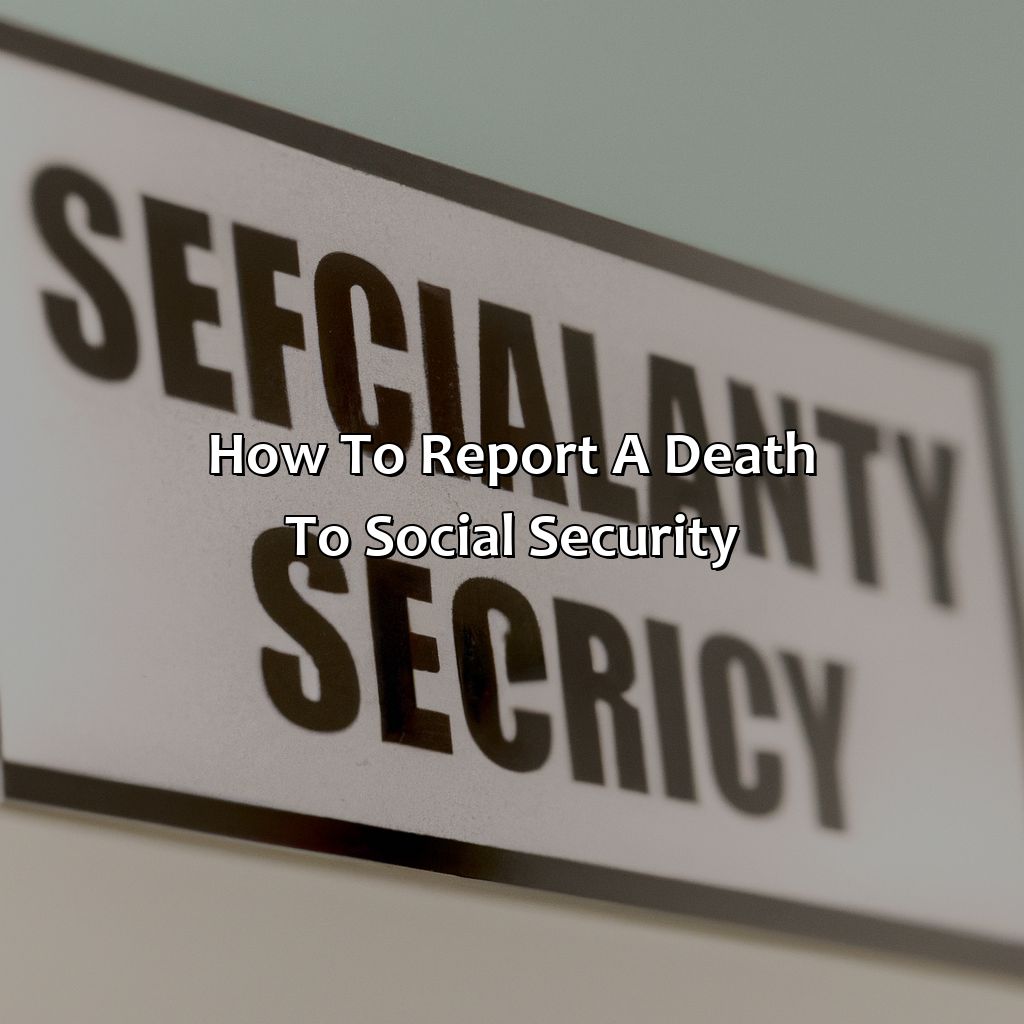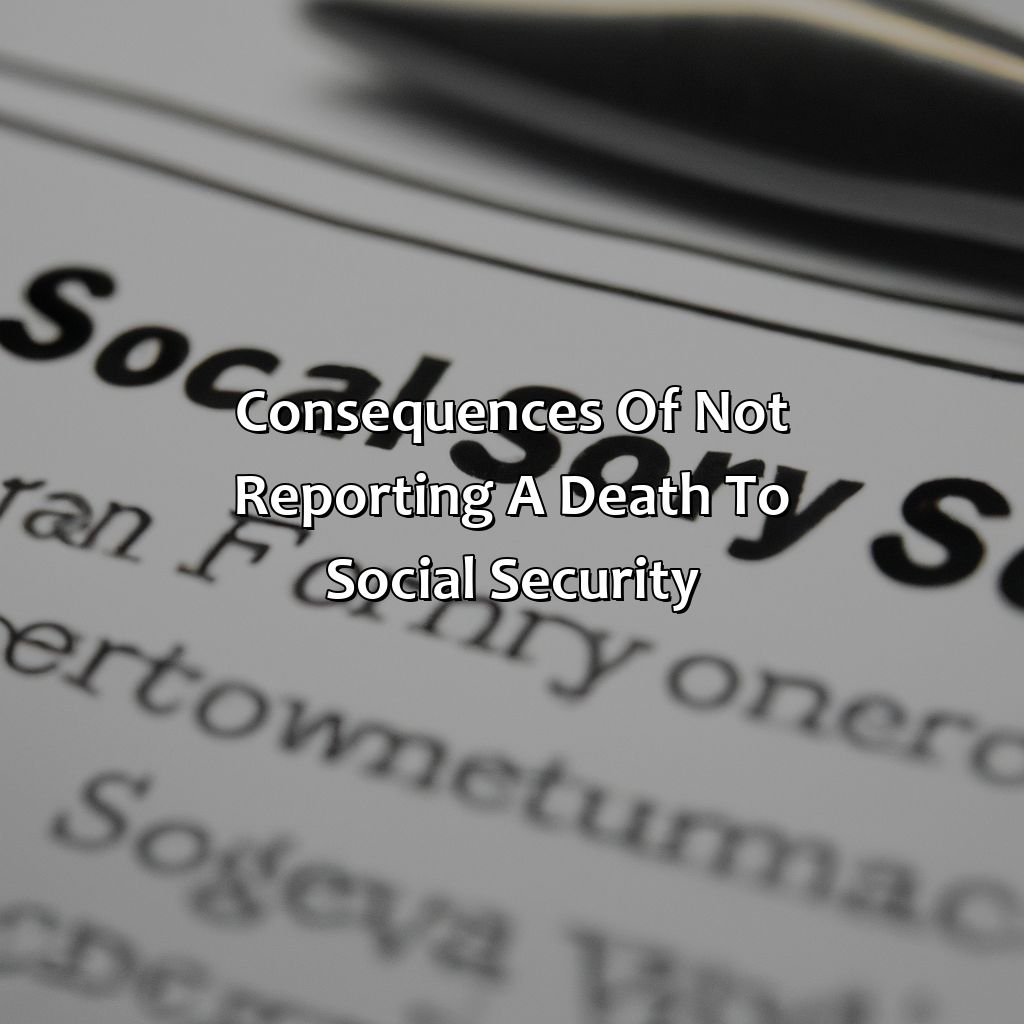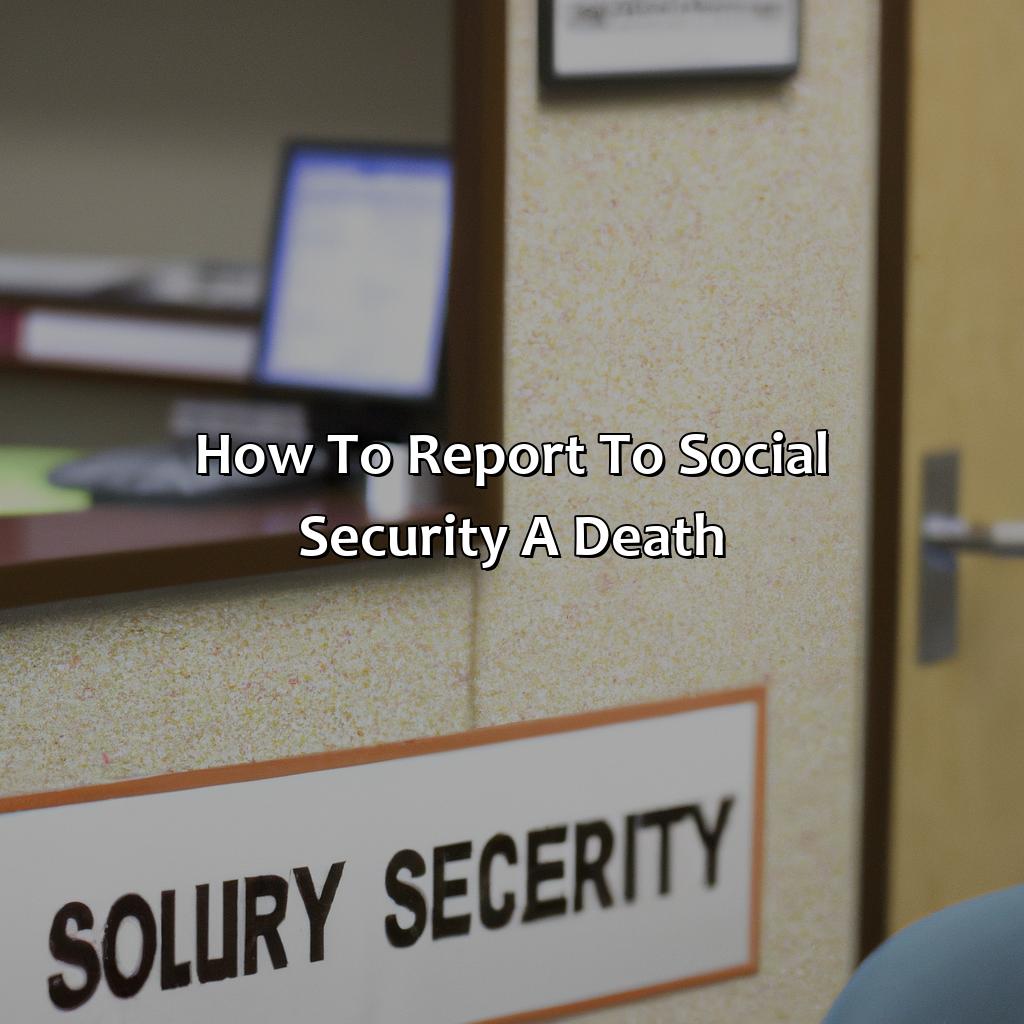How To Report To Social Security A Death?
Key Takeaway:
- Reporting a death to Social Security is necessary to ensure that the deceased person’s benefits are stopped and surviving family members receive the benefits they are entitled to.
- The required information to report a death to Social Security includes the deceased person’s social security number, date and place of death, and the purpose of reporting.
- You can report a death to Social Security online or by phone, or in person by visiting a Social Security office. It is important to report a death as soon as possible to avoid overpayments and other issues.
Has a loved one recently passed away? Are you unsure of how to report the death to the Social Security Administration? With the right information, you can easily report the death and manage the related benefits. Let us show you how.
Required Information to Report a Death to Social Security
You need certain info to report a death to Social Security. This includes the deceased’s Social Security Number, the date and place of death, and the reason for the report. Let’s go through all of these, so you can give the correct information quickly.

Image credits: retiregenz.com by Adam Washington
Deceased Person’s Social Security Number
The Social Security Number of the deceased person is a crucial piece of information required to report a death to Social Security. It helps identify and prevent fraudulent activity, ensures accuracy while canceling benefits, and allows the agency to track the deceased individual’s contributions. Providing this information promptly can help expedite the process for any surviving family members or beneficiaries.
When reporting a death to Social Security, it is necessary to provide the deceased person’s Social Security Number (SSN). If you do not have it, other identifying information such as name, date of birth, and place of birth can be used to verify their identity. The SSN may be available on various documents like previous year’s tax returns, W-2 forms, bank statements or medical cards.
It is important to report the death promptly as delay can lead to an overpayment of benefits that will need to be returned later. It can also cause undue distress for surviving dependents who may be relying on these payments. In case you want any further assistance in reporting please get in touch with social security office.
One of my acquaintances failed to report his wife’s death initially which caused genuine hardships in receiving timely benefits. The delayed application resulted in his son losing college funds that were intended for him from his spouse’s account in addition to her personal benefits payments being stopped suddenly without warning. This experience taught me the significance of prompt reporting while navigating through such challenging times.
Unfortunately, ‘six feet under’ is not a sufficient answer when reporting the date and place of death to Social Security.
Date and Place of Death
Reporting a deceased person’s information to Social Security Administration requires certain particulars. These include the occurrence date and place of expiration of the individual. Such specifics help facilitate benefits such as survivor payments, funeral expenses, and lump-sum death payments. It is vital to provide accurate and timely information to avoid any delay in benefits processing.
Additionally, providing specific details like city or county of death can assist in locating stray records if needed. A copy of the death certificate may also be necessary for verification purposes, but it is not mandatory. The social security number of the decease should also be available.
Pro Tip: Contact Social Security Administration by phone or make an appointment online for faster processing time and convenience.
Reporting a death to Social Security: because death is the ultimate retirement plan.
Purpose of Reporting Death to Social Security
When a loved one passes away, reporting their death to the Social Security Administration is crucial. Doing so allows for survivors to receive any benefits that may be available to them. The purpose of reporting death to Social Security is to prevent fraudulent usage of the deceased’s Social Security Number, which could cause harm to their credit score and future financial well-being. Survivors can report the passing in person, via phone or by mail, and must provide certain information about the deceased, including their full name, date and place of birth, and Social Security number.
It is important to note that if a family member or spouse was receiving benefits based on the deceased’s work record before their death, they must also notify the SSA. Furthermore, if there were any direct deposits into the account after the individual passed away, those funds must be returned promptly.
In 2020 alone, over 2.7 million reports of death were made to the SSA. Reporting a death to Social Security – because even the Grim Reaper needs to update their information.
How to Report a Death to Social Security
Need to report a death to Social Security? We’ll show you how! You can do it online, on the phone, or in person – we’ll cover each way separately. Let’s get started!

Image credits: retiregenz.com by James Woodhock
Reporting a Death to Social Security Online or by Phone
When it comes to notifying Social Security of a death, phone and online options are available. To report a death to Social Security, you can access their website or call them directly. This ensures that any eligible survivor benefits will be paid out promptly.
To report a death online, head over to the Social Security Administration website and fill in the required information, including personal details about the deceased, their social security number, and date of birth. You’ll also need to provide your own details as well as some paperwork related to the death. Alternatively, you may call the SSA directly and follow the instructions for reporting a death.
It’s important to keep in mind that survivor benefits may be crucial for loved ones who have been left behind. That’s why it’s essential that you report a death as soon as possible to avoid any unnecessary delays in receiving benefits.
If you’re not sure what steps you need to take when reporting a death to Social Security, consider seeking guidance from someone with experience handling these types of situations. By following their advice or consulting knowledgeable resources, such as those provided on the SSA website or by calling customer support lines, you can help make sure that all necessary steps are taken promptly and correctly.
Looks like you have a date with the Social Security office, but this time you won’t be filing for benefits.
Reporting a Death to Social Security in Person
When it comes to personally notifying the Social Security Administration of an individual’s death, certain steps must be followed. Here’s a guide on how to report a death to Social Security in person:
- Obtain necessary documents such as the deceased’s social security number and a certified copy of the death certificate.
- Schedule an appointment with your local Social Security office by phone or online.
- Gather all necessary information and head to the office on time for your scheduled appointment.
- Present all required documents at the office and answer any questions that may arise from staff members before leaving.
It’s essential to note that if you have already notified other government agencies such as Veterans Benefits Administration, Medicaid, or the Internal Revenue Service, then they can transmit their notification of the death to Social Security on your behalf.
Did you know that in 2019, approximately 2.8 million deaths were reported in the United States according to data from the Centers for Disease Control and Prevention (CDC)?
Not reporting a death to Social Security is like hiding a body and hoping nobody notices.
Consequences of Not Reporting a Death to Social Security
Not informing Social Security about a death can have serious implications. Failure to report the death may lead to incorrect payments, and the mistakenly paid money will have to be paid back. Furthermore, the deceased individual’s dependents may not receive benefits they are entitled to. This can cause financial hardships for the deceased’s family members and loved ones.
It is essential to inform Social Security of the death of an individual as soon as possible. In addition to avoiding financial difficulties, timely reporting of the death can prevent identity theft and fraud. Fraudulent claims for the deceased’s benefits can be minimized by informing Social Security of the death.
It is crucial to keep in mind that reporting the death to Social Security does not cancel or stop the deceased individual’s payments. Payments may continue to be deposited into the account after death, and the family is responsible for returning the money to Social Security. This issue can be avoided by notifying Social Security immediately.
Experts suggest obtaining multiple copies of the death certificate, notifying relevant agencies like the Department of Veterans Affairs, and updating the deceased individual’s personal records, such as insurance policies, bank accounts, and wills.
All in all, timely reporting of a death to Social Security is essential to avoid financial and legal problems. It is necessary to follow the appropriate steps to inform the relevant agencies to prevent fraudulent activities, and to ensure that the deceased’s family members receive all the benefits they are entitled to.

Image credits: retiregenz.com by Yuval Arnold
Five Facts About Reporting a Death to Social Security:
- ✅ Reporting a death to Social Security should be done as soon as possible to avoid any overpayments or benefits paid out in error. (Source: Social Security Administration)
- ✅ The deceased person’s Social Security number, date of birth, and death certificate are required to report the death to Social Security. (Source: AARP)
- ✅ If the deceased person was receiving Social Security benefits, the benefits for the month of death should be returned to Social Security. (Source: Social Security Administration)
- ✅ Family members or funeral homes can report a death to Social Security on behalf of the deceased person. (Source: AARP)
- ✅ Surviving spouses or dependents may be eligible for Social Security benefits based on the deceased person’s work record. (Source: Social Security Administration)
FAQs about How To Report To Social Security A Death?
What should I do when a loved one dies?
It is important to report the death of a loved one so that you can take the necessary steps to settle their affairs. One important step is to report their death to Social Security.
How do I report a death to Social Security?
You can report a death to Social Security by visiting your local Social Security office, calling the Social Security Administration at 1-800-772-1213, or by using the online reporting tool available on their website.
What information do I need to report a death to Social Security?
You will need to provide the name, Social Security number, and date of death of the deceased person. You will also need to provide your own name and contact information if you are not the spouse or next of kin of the deceased.
What happens after I report a death to Social Security?
Social Security will stop sending benefits or payments to the deceased person’s account. If the person was receiving retirement or disability benefits, the final check that was due to them may need to be returned. Social Security will also update their records to reflect the death of the individual.
What if the deceased was receiving benefits as a spouse or dependent?
If the deceased was receiving benefits as a spouse or dependent, you should report their death to Social Security as soon as possible so that they can adjust the benefits accordingly.
Is there a time limit for reporting a death to Social Security?
There is no specific time limit for reporting a death to Social Security, but it is important to do so as soon as possible so that benefits can be adjusted or stopped accordingly.


